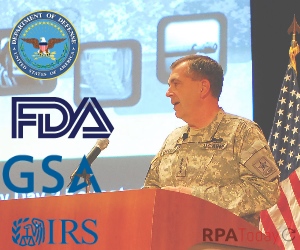
Federal agencies throughout the U.S. government are beginning to reap the benefits of a “community of practice” (CoP) created by the General Services Administration (GSA) earlier this year to explore opportunities for leveraging RPA. In September, the CoP had its first “industry day” in Washington, D.C., and attendees heard from several agencies that have embraced RPA for efficiency gains, productivity gains or cost reduction. The Internal Revenue Service (IRS), Food and Drug Administration (FDA) and the Department of Defense (DoD), featured at the industry day event, are among the heaviest users of RPA.
According to various published reports: The IRS will save 18,000 hours of manual labor with RPA pilots already underway in its procurement office; the Department of Defense just opened a Data Engineering Lab in its Special Forces Command in which it will explore opportunities to apply advanced technologies (including RPA); and the FDA is developing seven RPA projects as it looks to free up staff to focus on higher-level tasks.
Obviously, the federal government is going to be a heavy user of RPA. But, warns IRS Deputy Chief Procurement Officer Harrison Smith, how various agencies employ the technology will differ, so one-size-fits-all solutions will not be effective from agency to agency.
“They’re not all going to look the same,” Smith said at the industry event. “You have to make sure that if it’s an automation solution for another environment that you have the technology [people] and you have the systems integrators able to talk to the people who are actually performing the work.”

